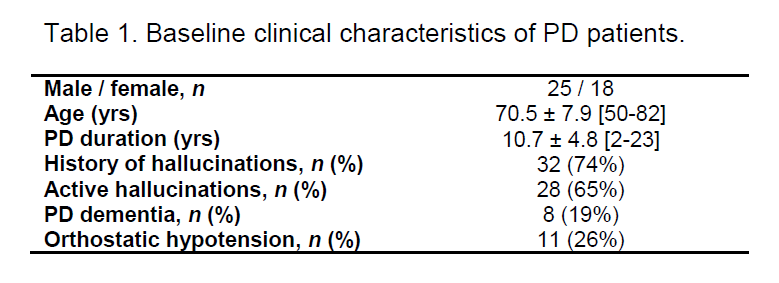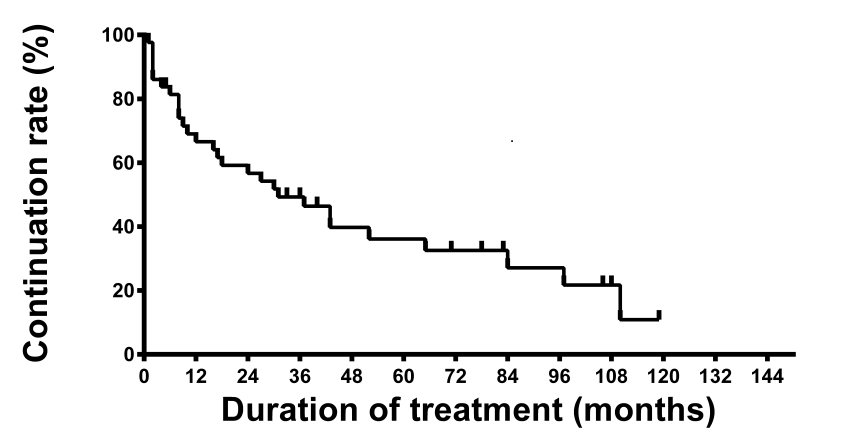Session Information
Date: Wednesday, June 7, 2017
Session Title: Neuropharmacology
Session Time: 1:15pm-2:45pm
Location: Exhibit Hall C
Objective: To review the outcome of continuous apomorphine infusion (CAI) in advanced Parkinson’s disease (PD) patients at the rehabilitation unit of the Parkinson Expertise Center (RU-PEC) Groningen.
Background: CAI is a widely used treatment in advanced PD. However, CAI is recommended for PD patients with only mild cognitive impairments, although positive effects of CAI on cognition and visual hallucinations (VH) have been reported earlier.
Methods: Advanced PD patients indicated for CAI treatment at the RU-PEC were included. Cognitive and motor function were assessed at baseline and repeated at the end of the admission. Follow-up data were obtained by reviewing patient’s medical records and were analyzed retrospectively.
Results: Apomorphine was initiated in 43 PD patients who had a contra-indication for deep-brain stimulation (DBS) due to high age (>70 years; n=27), cognitive impairment (n=12) or severe neuropsychiatric symptoms (n=1), while 3 patients did not want to be treated with DBS. Clinical characteristics of patients are shown in Table 1 [table1].
The total daily dose of apomorphine was 69 ± 29 mg. Due to the addition of apomorphine the levodopa-equivalent daily dose (LEDD) lowered with 17% during the admission. At the same time the number of patients treated with clozapine and cholinesterase inhibitors almost doubled.
CAI reduced daily OFF time and time with troublesome dyskinesia with 45% and 51%, respectively. The cognitive performance did not worsen during titration of CAI [table2].
Overall, 34 out of 43 patients could be referred to their homes again, whereas all patients were not able to live independently at admission. In total 7 patients required long-stay nursing home placement. The duration of CAI treatment was 36 ± 35 months [figure1]. At the end of 2016, 13 patients were still on CAI, 17 deceased during CAI treatment, 3 stopped due to lessening of therapeutic effect, 2 were lost to follow-up, while 7 patients withdrew CAI due to side-effects during the follow-up. Only 4 patients had to stop CAI after years of treatment because of worsening of VH and/or orthostatic hypotension (OH).
Conclusions: This study demonstrates that CAI is an effective treatment in advanced PD patients, even in a cohort of elderly patients with VH and/or OH. Irrespective these risk factors CAI treatment could be continued during 3 years on average, in combination with optimized treatment of their existing VH and/or OH.
To cite this abstract in AMA style:
R. Borgemeester, T. van Laar. The efficacy of continuous apomorphine infusion in advanced PD patients with cognitive impairments [abstract]. Mov Disord. 2017; 32 (suppl 2). https://www.mdsabstracts.org/abstract/the-efficacy-of-continuous-apomorphine-infusion-in-advanced-pd-patients-with-cognitive-impairments/. Accessed July 10, 2025.« Back to 2017 International Congress
MDS Abstracts - https://www.mdsabstracts.org/abstract/the-efficacy-of-continuous-apomorphine-infusion-in-advanced-pd-patients-with-cognitive-impairments/



